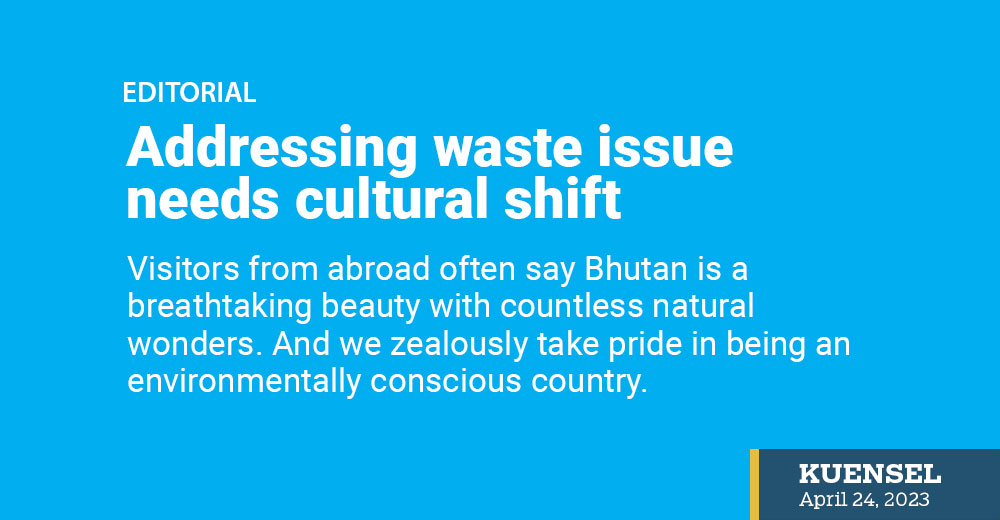Visitors from abroad often say Bhutan is a breathtaking beauty with countless natural wonders. And we zealously take pride in being an environmentally conscious country.
However, the continuing surge in waste generation is fast becoming a major issue facing that cannot be ignored any longer. The image of an elephant scavenging through waste in Samtse is a glaring reminder of this problem. Haa, a quiet and far-off dzongkhag with ambitious tourism goals, is facing a significant waste management challenge.
The rise in population, economic development, and consumerism has led to an increase in waste generation in Bhutan. The lack of proper waste management infrastructure has made the situation worse, leading to environmental degradation, air pollution, and contamination of water sources. We know where the problems are coming from; we should be able to figure out what interventions to put in place.
It is imperative that the government takes a proactive approach towards developing waste management infrastructure across the country. Innovative solutions such as micro-composting, zero-waste models, and community-based waste management should be promoted more vigorously to reduce waste generation and promote sustainable living practices.
More important, we must know that waste reduction is not only the responsibility of the government; it is a shared responsibility of every Bhutanese citizen. Adopting simple habits such as carrying a reusable bag while shopping, segregating waste at the source, and composting kitchen waste can go a long way towards reducing waste generation. Additionally, heavy penalties and fines should be imposed on litterbugs, to enforce the importance of keeping Bhutan clean.
Education and awareness campaigns are key. Lack of awareness about waste management and its impact on the environment is a major problem. Public campaigns and education programmes can help address this issue by informing people about proper waste disposal methods and the importance of waste reduction.
Next, we need to improve waste collection systems. The current waste collection system is inadequate, and waste often ends up being dumped in inappropriate places. We must also give top priority to recycling and composting which can help reduce the amount of waste that goes to landfills.
All these approaches have been tried. We need better, practical solutions to address the problem of growing waste in the country.
How about introducing incentives for proper waste management—incentives can be given to individuals, households, or communities that take part in waste reduction initiatives. Harsh penalties for littering, especially in public areas can help, but incentivising individuals and communities for proper waste disposal will certainly encourage more people to participate and take responsibility for their waste.
Addressing the issue of waste in Bhutan requires a multi-pronged approach that includes education, awareness campaigns, improved waste collection systems, and incentives for proper waste management. But more important, there is a need to build and nurture a culture that does not tolerate mindless littering.


